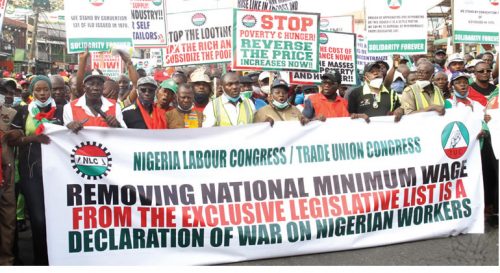National Assembly, labour meet Tuesday over wage differential bill

A meeting between the National Assembly and organized labour over the differential wage bill has been scheduled for next Tuesday. Alhassan Ado-Doguwa, Majority Leader of the House of Representatives, said this while addressing protesting workers on Wednesday at the National Assembly Complex, Abuja.
Hon. Ado-Doguwa, had received labour’s petition jointly submitted by Ayuba Wabba, the President of the Nigerian Labour Congress, (NLC) and, Quadri Olaleye, his Trade Union Congress, (TUC) counterpart.
“I want to assure you that the House of Representatives will give you a listening ear and fair hearing. We will listen to your grievances. We will still invite you to come and engage with the relevant committee, of which I am a member; the constitution review committee”, said Ado-Doguwa.
“You will come and make your positions known formally; your positions will be heard at the committee level. And when we come to plenary, if we consider the bill, the members that are representing your constituencies will be on the ground that day to do justice to the bill.
“And I can understand: the only justice to that bill is to kill it. (workers chorused ‘yes’). Is that your position? Is that what you want? Then, I will like to advise you: go ahead and lobby members that you elected. Tell them that you don’t want that bill, and the members will stand for you and make sure that the bill is killed,” the lawmaker stated while addressing the protesters.
On his part, NLC President Wabba said aggrieved workers had demanded a nationwide strike, if the National Assembly fail to withdraw the bill.
“We are here today on behalf of the Nigerian workers, pensioners, the downtrodden, to make it clear and unambiguous that the bill that seeks to remove the minimum wage from the exclusive list to the concurrent list is not accepted,” he said.
The labour leader said bad governance was Nigeria’s problem. He said, more so, that labour leadership had suggested to government ways of reducing high cost the cost of governance, in order to save more funds for payment of workers’ salaries.
The National Assembly has begun considering a bill removing the wage negotiation from the exclusive list to the concurrent list. If the bill is passed into law, it means each of the 36 state governments will negotiate workers wages based on its financial capacity.




